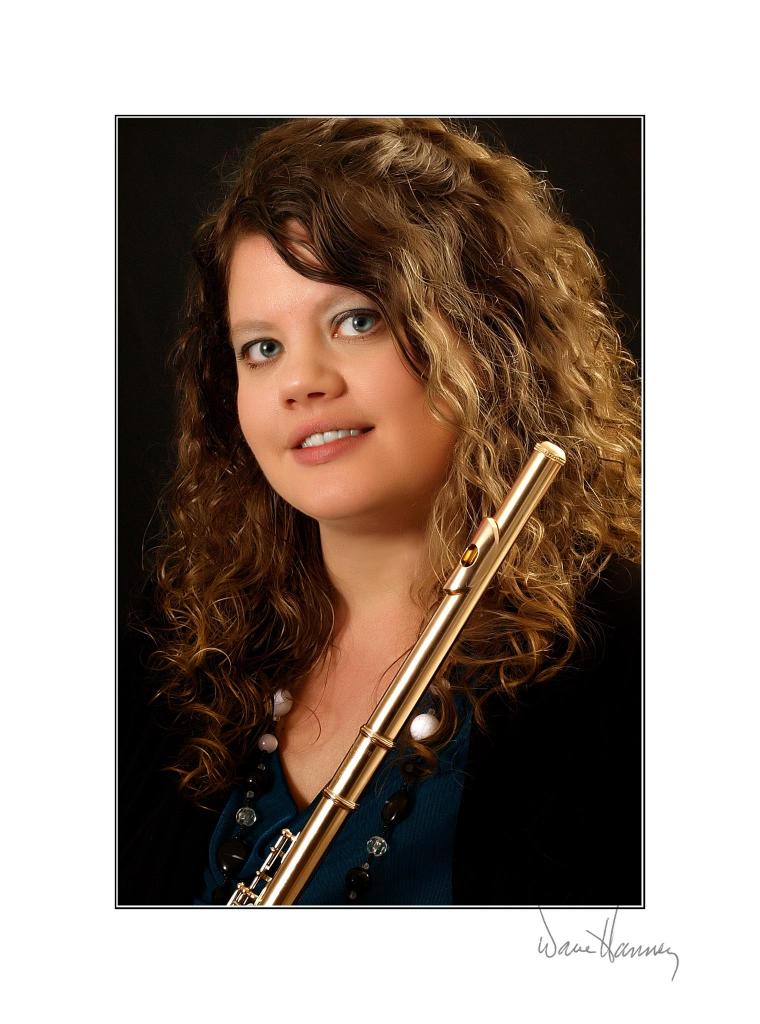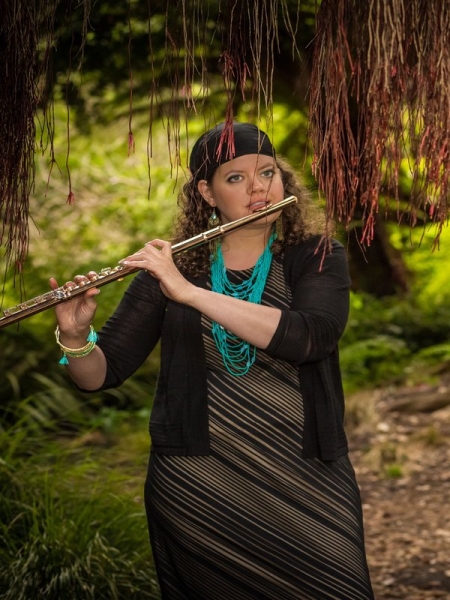
New Age Music is like Universal Language—Interview with Flutist Monica Williams
20 December 2018 Music Sanathana Vani
Many teenagers around the world are troubled by the idea of not knowing what to do. Some get a clear inspiration for pursuing an idea, a vision, or a profession that makes them experts of those fields. Doubtlessly, there is a lot of struggle, hard-work, and sweat that goes in the formative years, but there is no denying that all this feels exciting and fulfilling at that time. And nothing is more fulfilling than realizing one’s passion, one’s vision after putting up your body and mind into it.
The struggle, the hard-work, the sweat—all contribute to making inspirational stories and valuable examples for the youngsters to follow suit, and to try to be successful in their chosen fields. It is like a plant which looks at the mighty Banyan tree and gets inspired to face the tempests and extremities of weather that the life will bombard it with, knowing that once it is grown, it will provide shade and shelter to so many, and will become an asset to the eco-system itself.
We are here to know Monica Williams, who pursued her passion for music since her childhood and transitioned into a performer, and later started sharing her wisdom with others, just like the Banyan tree, who no longer cares for the worldly winds, and is instead a beacon of hope.
Q1. Tell us your first break with music you can recall. How did you get inspired to make a career in music?
Such a good question! I guess it would depend on how you define a break. I would say my first huge break was getting into Eastman School of Music. It was a fantastic education and kind of hard to get nto that school. I valued my teachers and training, so I really thrived there.
I was fortunate to just know I wanted to do music since age 14. I loved it and really could not see doing anything else. Now, my vision and pursuit within music has changed since that early age–but I knew I wanted to do music. It’s funny I was just having this conversation with a high school student this week. She asked me, “Did you always know you wanted to do music?” And the answer was yes. She was concerned that she did not know what she wanted to do yet. And we talked about how it was a blessing to have that vision so early, but on the other hand because I always knew this–I did not have to push myself to explore other possibilities of what I might want to do. I think this can really be beneficial for a young person. Just because you love playing music, does not mean that you are going to love having a career with it. And that is okay! I am fortunate to have had a love for both.
Q2. What made you pick up flute as your chosen instrument?
In 5thgrade, we had a band director come into class and explain all the instruments so we could make a choice. I remembered the music and story “Peter and the Wolf” by Prokofiev. The flute is represented by the bird and was my favorite. It was an easy decision.
Q3. Share the routine of your early days–how much practice did you do; what kind of lessons you took; what type of environment you had regarding support from the parents etc.
My parents were very supportive. In high school, they would drive 30 miles 3 or 4 times a week to take lessons and participate in ensembles in the Chicago area. I loved music and was slightly competitive. This put me into a practice mode of about four hours a day, give or take. While other kids were out playing and planning proms I was in my room practicing!
Q4. When it came to convert yourself from a learner to a performer, did you face difficulty or even a moment when you thought you should have done something else?
Ah, a great question again! I am still a learner who happens to be a performer as well. I think in order to be a great artist, you always must be willing to strive for a different perspective and always work on improving your skills. I still practice almost every day to try and improve.
I would say a difficult time that I questioned my decision was right after college. I had all these amazing skills, and not a way to apply it so I could make a living. I moved to San Francisco to be with a boyfriend and was working full-time in a restaurant so that we could pay rent—well, he was not really paying rent so it was on me–a life lesson for another interview- LOL! But for a period of time, I was too tired to practice and did not feel motivated to create. At that time I was pursuing mostly classical music. They did not tell you that when you get out of school it cost a great deal of money and time to land an orchestral job. You have to travel to these auditions, and do many of them before getting a job. I had neither money nor time. I wanted to teach students, but it takes time to build a teaching studio. And I did not really get training on how to be an entrepreneur at my college (they have since changed this- but there was nothing available when I went to school). So, I had to learn this on my own. I am happy to say I learned these lessons and love what I am doing and make a good living at it, but this was not always the case at the beginning. It is rough starting out. My advice for students right out of school is to get out there and build connection. Learn what others are doing in your industry that is working, and look for opportunities to learn from a variety of sources. Don’t wait for opportunities or students to come to you.
Q5. You trained in classical music but how did you venture into New Age and World Music?
I think it was a natural transition. The first real moment was when I started including world flutes into my playing. I was at the National Flute Association and there was a vendor selling Native American Flutes. I went up to just try it and fell in love with the sound. I had a light bulb moment “Why am I not playing more of these in my music?” It opened up so many more colors in the sound, and that led me to more world/new age music. I co-founded the ensemble Phoenix Rising with a pianist Wendy Loomis and we released 4 CDs. That was my first entry into the New Age genre.
Q6. Can you tell us your passion for flutes–it seems you have a vast collection of various flutes?
Yes, I tell people that this is my healthy addiction! Sometimes I just play a flute and know I need to get it. I have about 80 flutes now; some silver and gold of all sizes. And the majority are wood flutes like Native American, Chinese, Pan, and bamboo flutes.

Q7. What inspires you best to create music?
Honestly, it starts with the tone of the flute. I like to start with one note and let the story unfold. I usually start with an improvisation based on that sound. Some become structured pieces, and some stay like loose ideas that change slightly depending on my mood.
Q8. What kind of impact you want to leave your listener with–would like to you limit your music to relaxation, meditation, or similar categories?
I would love my listeners to take whatever they need from the music. If someone has anxiety, perhaps listening might help with relaxation. Meditation is a great way to start and end your day to help center you. Listening to new age music can help a student focus and study. Heart Dance Records has many playlists to cater to these experiences.
Q9. You have been teaching kids—Now how different does it feel to teach music from performing?
I love teaching students. I feel like me and my private students are a team working together to figure out what works and the best way to move forward. This is similar to working with other artists in a performance. Great communication and trust are needed. However, when teaching, it is my job to help explain an idea, a concept or a piece in 100 different ways until a student understands it. Not everyone learns the same way so no two students are going to be alike. This process of teaching helps me continue to grow as well. I have students from age 5 to 90 and I love teaching students for a wide range of backgrounds and skill levels. So, I guess when performing I am giving a unique experience and connecting to an audience for that single experience. With teaching, we are on a journey together, often for many years.
Q10. You work with a lot of other artists too. How enriching is it to collaborate with other musicians and how effective is it to refine your skills?
It is so amazing! I get new ideas and energy when playing with great artists. I was so grateful to have Sherry Finzer on Bass flute, Darin Mahoney on guitar, and Alexa Nadramia on ‘Journey of Tears.’ I also was so fortunate to work with a fantastic musician, engineer, and producer John Herrera.
Q11. You just came up with your first album–how fulfilling the experience has been?
It’s been great. I could not be happier with the response. A musician puts out music so they can share their talents. I wake up every morning to see people from 64 countries listening to my music on Spotify. The cool thing about new age/world music is there are no words–so in many ways, it is a universal language. Even if I only reach one person it would be worth it, but if I can reach that many it really inspires me. And I’m already working on my second album to be out next September 2019!
Q12. Share a message for our readers and budding musicians.
Thanks for taking the time to read this! Being a musician is not the easiest profession in the world, but all professions have some challenges to them. Don’t get discouraged when you get a rejection or bad review. It really comes with the territory of being an artist. Every artist has these! Onwards and upwards!
Interviewed by,
Vivek Kumar